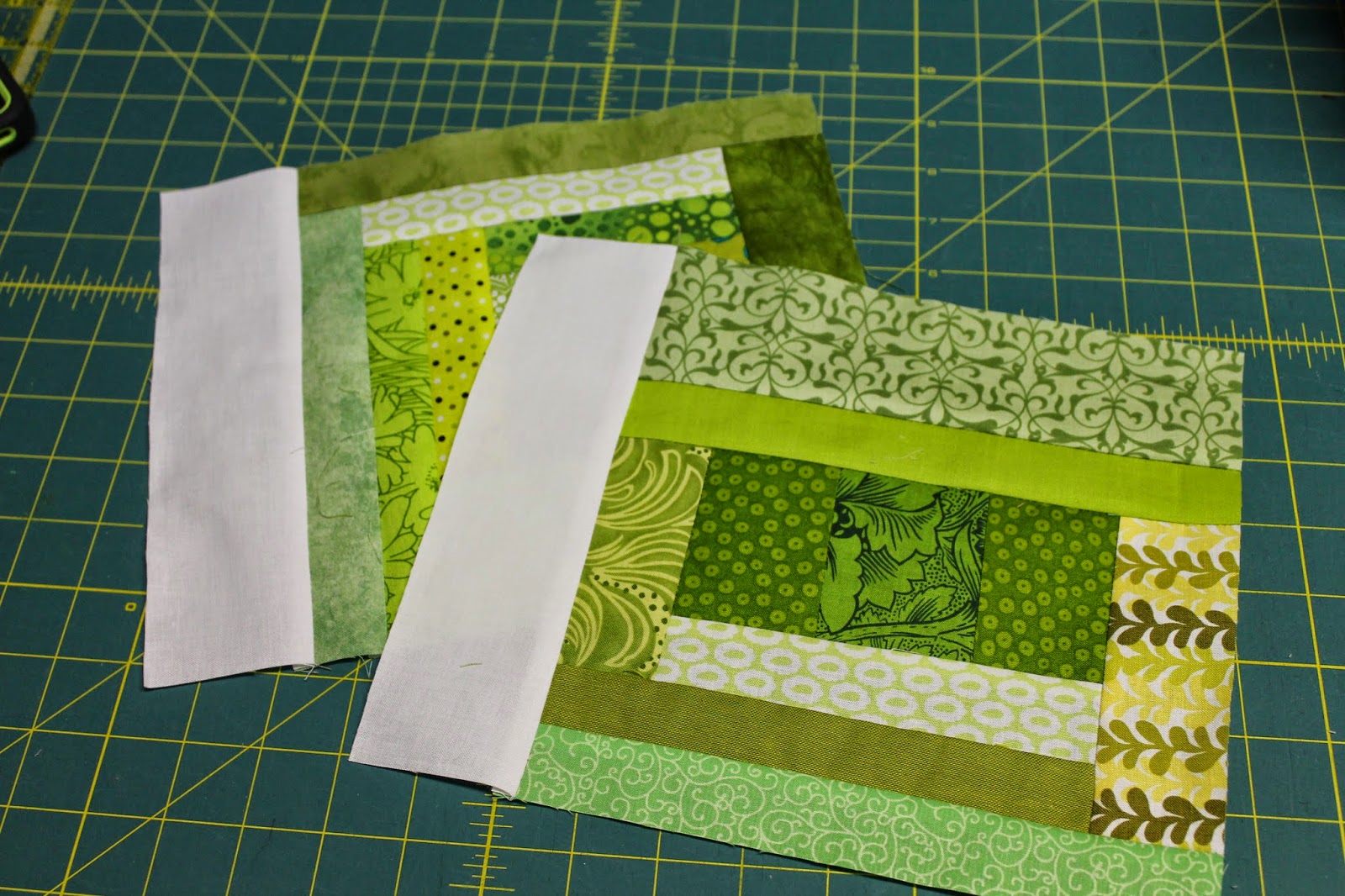
I so enjoy seeing what others are doing with their scraps and as part of my Oh Scrap! series of posts, I want to share with you some of the projects I find (and the talented bloggers behind them).
Today, we are meeting Cassandra who blogs at
The (not so) Dramatic Life. I first "met" Casandra when she won one of my recent giveaways. It just so happened she had just started
her blog and remembering those early days of blogging when you mostly feel like you are talking to yourself, I thought I would support her and
follow her blog.
Boy am I happy I did! She continues to inspire me with each new post.
Cassandra is currently working on a mini quilt series that I am fascinated by. So many great ideas!
Just before the holidays, Cassandra shared a tutorial on making cute little zippered coin pouches that are perfect little scrap projects because they require such small pieces of fabric. And when I asked her if I could feature them on my blog, she gave me permission to post the whole tutorial. Thank you Cassandra!
So I am just going to share Cassandra's post. Thank her for sharing by checking out her blog at
The (not so) Dramatic Life and go ahead and
follow along for some great inspiration.
As my nieces and nephews have gotten older, cash or gift cards have
become the favored gifts for the holidays because money always fits! I
try to get a little creative in the presentation of this
not-particularly-original gift, so this year I am making cord pouches
that hook onto a keyring. These pouches finish at a little under 4″
from side to side, so they can easily hold a thumb drive, USB cord, some
change, or even most phone chargers. Come to think of it, I may need
to make a couple for myself!
I knew that I wanted to put a grommet in each pouch to attach a key
ring. (If you don’t have grommets laying about, a ribbon loop inserted
into a seam would also do the trick.) I thought that the grommet would
look nice in a corner, so I experimented with a couple different shapes
before settling on an octagon. This project will work with most shapes,
but if you would like to play along using the octagon, I have included a
pattern here. This
Octagon Pattern is a PDF File you are welcome to download.
I made six pouches, choosing an outer fabric and a lining fabric for
each. Orange tends to be pretty popular among my nephews, so I used a
lot of it this year! I cut one octagon out of each fabric, but for the
front side I cut rectangles to set the zipper into before cutting it
into shape. I like to give myself some wiggle room when dealing with
zippers, so I cut the rectangles to about 3″x5″. For each pouch you
should have 2 outer fabric rectangles, 2 lining fabric rectangles, 1
outer fabric octagon, and 1 lining fabric octagon. You will also need a
zipper and either a grommet or a small loop of ribbon.
Pieces cut for cord pouches
For an exposed zipper I like to sandwich each side of the zipper
between the outer and lining fabrics along the long edge of the
rectangle. I like to pin the layers in place so nothing moves out of
place while I’m stitching. The navy floral fabric will become the
outside of this pouch, so it is laying with the right side of the fabric
facing the top of the zipper. The right side of the lining fabric
faces the back of the zipper. This leaves the wrong side of the fabric
exposed on each side of your zipper sandwich. I like my fabric edges to
line up with the edge of the zipper. I also place the fabric in the
center of the zipper so I can sew it in place without the pull getting
in the way.
Now you are ready to start stitching! You will want to use your
zipper foot and stitch a consistent distance from the teeth of the
zipper. I like to line up the right side of the zipper foot with the
edge of the zipper, but machines can vary, so choose a means of
measuring that works for you.
Using the zipper foot to stitch a zipper in place
Now you are ready to press the fabric out to expose the zipper. I like to press the outer fabric into place first.
Pressing the outer fabric into place around the zipper
Then you will press the lining fabric toward the back.
Fabric Pressed in place once the zipper is sewn
Next you will perform the same steps to sew the remaining rectangles to the other side of the zipper.
For added stability, I like to topstitch the fabric about 1/16″ from
the seams we just sewed. If you have an edge stitching foot, it will
make this step easier, but it can also be done with a regular foot (and a
little patience!)
Once you have the topstitching done on both sides of the zipper, take
a moment to admire your work! Now trace your octagon pattern onto the
fabric, paying carful attention to where you want the zipper placed. I
decided to center the zipper across the octagon for this set of pouches.
Do NOT cut yet!
Tracing the octagon onto the front of the pouch
We are going to use a very small seam allowance for these pouches, so I decided it would be easier to sew first, cut later.
Move the zipper pull tab into the center of the octagon!
(If you are going to insert a ribbon loop, now is the time. Place the
loop toward the center of the octagon, with the ends sticking into the
seam allowance. Pin or Baste into place.) Take the octagons you cut
out at the beginning of this process and place the outer fabric piece
right side down onto the zippered section. Carefully line up the cut
shape with the traced shape. Layer the lining fabric octagon, right
side up, on top of the outer fabric octagon. With the zipper pull in
the center of the octagon, the cut pieces may not naturally line up with
all corners. This is an instance where you should make the fabric line
up the way you want. (If you don’t, the zipper may gap in an
unpleasant manner.) I pin in each corner, but add as many pins as you
need to feel comfortable.
Pinning the front and back together
Stitch all the way around the octagon using a seam allowance of a generous 1/8″
Stitch around the shape using a seam allowance of 1/8″
Check around the edges of your shape to make sure that all layers
have been stitched properly. Now cut away the excess material in the
zipper layer leaving the 1/8″ seam allowance.
Carefully clip the corners in order to achieve nice points when the shape is turned.
Pouch with clipped corners
Turn the shape right side out using the zipper opening. Press to flatten the shape. Make sure you have pretty corners!
Pouch turned right side out
To enclose the raw edges of the seam allowance, you will now want to
top stitch 1/4″ from all edges of the octagon. I started and ended the
stitching in the corner I was planning to place the grommet since the
stitching won’t be visible at that point. When stitching over the
zipper, I chose to turn the machine side wheel by hand, taking a large
stitch over the zipper teeth, lifting the presser foot, moving back, and
taking another large stitch over the zipper teeth. I repeat this
several times to secure the zipper. (This should act as the equivalent
of several zig zag stitches in a single spot often used to shorten a
zipper.)
Since we used such a small seam allowance, I like to add another row
of top stitching just under 1/8″ from the edge of the octagon.
Now that everything is sewn, it is time to add the grommet. A
grommet has two pieces: a grommet, and a washer. You will also need a
hammer, punch, and a setter to install a grommet. I used the 00 size
for this project.
Once you have decided where to place the grommet, lay the pouch on a
piece of scrap wood, position the punch, and give it a couple whacks
with the hammer. You should now have a nice clean opening to insert the
grommet.
Top Stitched Pouch with hole punched and grommet ready to install
Place the grommet through the hole you punched in the pouch, then
place the washer over the center of grommet. The grommet will be placed
in the anvil portion of the setter. The setter will fit into the
center opening of the grommet (on the washer side), and it should then
be tapped firmly several times to set the grommet. You want to hit the
setter hard enough to set the grommet, but not so hard that the grommet
splits. When in doubt, start with moderate force and increase as
necessary.
There you have it- A useful little gift that practically everyone will find a use for. I added some candy to sweeten the deal!

Finished Pouch, All wrapped up!
Thanks again for sharing Cassandra! I am looking forward to giving these a try in the future.
Now I hope you share what fun things you are doing with scraps this week. Here are the details for linking up:
- This linky party is for any scrappy project - It can be in-process or a finished piece.
- You can link up your blog post (not your homepage please) or
Instagram photo from the past week that features your use of scraps.
- If you are linking to a blog post, I ask that you link back to my
blog somewhere in your post. So if you are writing about scraps, just
get into the habit of including a link as there will be a linky party
available every week!
- If you are using Instagram, please use the hashtag #ohscrap.
- This is a party so remember to socialize and comment on the posts of others.
- Following my blog is not necessary but it sure would be great if you do!
<a href="http://quiltingismorefunthanhousework.blogspot.com/"
target="_blank"><img
src="https://blogger.googleusercontent.com/img/b/R29vZ2xl/AVvXsEg54Z8EyMCoCg0j1sBoz_APBotiRQveh32vQoL2dCSO4nQFAi8du60IuUCQp3Hb18vGD8IrM0W6_vmuufImGcr4Pf2Ve2dNIWd5LbQJfyDTRjtcekT6coT7c2nSCOG_9dvjiKGVAnuTN70/s1600/Oh+Scrap+Button.jpg"
alt="Quilting is more fun than Housework" width="125" height="125"
/></a>
So if you love scrappy projects, feel free to grab my button for your
sidebar or posts and get ready to share all your wonderful projects from scraps.
And if you have a great idea for using scraps and would like to be
featured, feel free to contact me!
If you are interested in more ways to follow me, you can find me on
Craftsy,
Facebook,
Pinterest,
Bloglovin',
Feedly,
Instagram,
Google +, or get my blog sent right to your email inbox by entering your email address on the right sidebar!
Linking up:
Sew Fresh Quilts
































